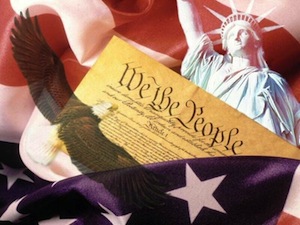 One of the most surprising events in the American founding occurred when the Continental Congress used the word “happiness” in the Declaration of Independence.
One of the most surprising events in the American founding occurred when the Continental Congress used the word “happiness” in the Declaration of Independence.
Up to that point, it was not a word often utilized in great political writings. Words like “justice,” “liberty,” “property,” “honor,” “power,” “rights” and others were expected in such a document.
But “happiness” was not.
George Washington expressed the American perspective when he said,
“The United States came into existence as a nation, and if their citizens should not be completely free and happy, the fault will be entirely their own.”
In this view, a good government protects people’s freedom, and what they do with it is up to them — and determines their happiness.
Still, the very idea that governments are instituted among men to do just this (protect a person’s right to pursue happiness), was a significant thought.
It was certainly not the view of the European aristocrats, who believed that happiness required financial means and the comforts of leisure time and was only meant to be enjoyed by a few.
The American founding generation took a different view. They believed that happiness was the result of enterprise, and was possible for everyone.
This is a patently American perspective, and it provided a foundation for the whole American freedom experiment. It is a profound idea.
If happiness is the result of individual actions and choices, then it follows that government’s primary role is to protect the right to act and choose.
Indeed, in such a view, the only purpose of government and law is to keep any person from taking these rights from anyone else — or of enforcing restitution if such protection fails.
This is the proper role of government: to protect inalienable rights (defense), and if this fails to cause restitution (justice). This was the crux of the American system, the only one that could really be adopted if the goal of government was to protect “life, liberty and the pursuit of happiness.”
In ancient Rome, the Stoics argued that virtue is the cause of happiness, and this same view was promoted by ancient Judaism and early Christianity.
In feudal times, the meaning of happiness switched more to “good fortune,” which took it out of the hands of each individual.
By 1600, however, this was refined to mean “a pleasant and contented mental state.”
The American founding generation added to the definition of “happiness” with the idea of voluntarily doing meaningful things — from personal morality to economic enterprise, to family relationships, political and military sacrifice, and charitable service.
They also connected these same things to the concept of freedom, thereby forever linking the words “freedom” and ‘happiness.”
This bears repeating, because it is a central foundation of American government, but has been mostly forgotten today. Specifically, the American founders put forward an amazing new view of government:
The proper role of the government is to protect inalienable rights, and to leave everything else to the people — who will increase or lose their liberty and happiness according to their personal virtue, economic enterprise, family relationships, charitable service, and other voluntary choices.
For the Founders to adopt this view was a remarkable and vitally important turn of world events, and it established a whole new view — and era — of freedom.
To a large extent, we have now lost this view, and our freedoms have decreased with this change. We now follow the more traditionally European perspective that great changes in society come from the upper class, experts, elections, and government officials and policies.
The Founders disagreed. They believed that the American Founding was the result of the people, not a few great leaders.
As John Adams responded when someone tried to compliment his role in the founding:
“Don’t call me ‘Godlike Adams,’ ‘The Father of His Country,’ ‘The Founder of the American Republic,’ or ‘The Founder of the American Empire.’ These titles belong to no man, but to the American people in general.”
Freedom and happiness are always connected, and they are always up to the regular people, whether they realize it or not.
To the extent that freedom is declining, it is the fault of the regular people. Our freedoms and happiness are up to us. If freedom is in decline, we aren’t doing enough.
The good news is that the people have the power to do something about it, no matter how much the experts try to convince us otherwise.
 Oliver DeMille is the New York Times, Wall Street Journal and USA Today bestselling co-author of LeaderShift: A Call for Americans to Finally Stand Up and Lead, the co-founder of the Center for Social Leadership, and a co-creator of TJEd.
Oliver DeMille is the New York Times, Wall Street Journal and USA Today bestselling co-author of LeaderShift: A Call for Americans to Finally Stand Up and Lead, the co-founder of the Center for Social Leadership, and a co-creator of TJEd.
Among many other works, he is the author of A Thomas Jefferson Education: Teaching a Generation of Leaders for the 21st Century, The Coming Aristocracy, and FreedomShift: 3 Choices to Reclaim America’s Destiny.
Oliver is dedicated to promoting freedom through leadership education. He and his wife Rachel are raising their eight children in Cedar City, Utah.






Speak Your Mind
You must be logged in to post a comment.